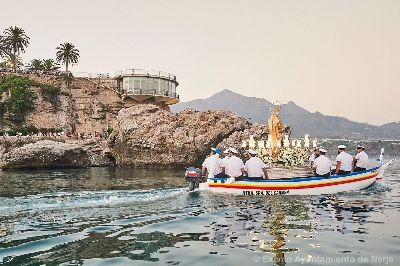
© Facebook Ayuntamiento de Nerja
У середині липня узбережжя Іспанії перетворюється на справжню сцену глибокої духовності та живої традиції. У ці дні країна відзначає свято Діви Кармен — покровительки моряків, рибалок та всіх, хто має справу з морем. Центральні урочистості традиційно відбуваються 16 липня, але в багатьох регіонах святкування розгортаються протягом усього тижня. Це не просто релігійне дійство — це культурне явище, глибоко вкорінене в ідентичність прибережних громад. У містах, як-от Сан-Педро-дель-Пінатар, Картахена, Кадіс, Малорка та Валенсія, свято поєднує християнське поклоніння з яскравим народним колоритом. Образ Діви Кармен — часто прикрашений квітами й морською символікою — несуть на плечах у супроводі духових оркестрів і молитов, перш ніж перевезти його на човні у відкриті води.Особливе місце у святкуванні займає морська процесія. Освячені човни, урочисті піснеспіви, кидання квітів у воду — усе це перетворює звичайний порт на сцену, де поєднуються віра, пам’ять і спільність. Моряки, рибалки та їхні родини таким чином вшановують не лише святу, а й пам’ять про тих, хто не повернувся з моря.Святкування має й соціальне звучання. У Картахені, наприклад, понад тонну свіжої риби було передано благодійним організаціям — як жест солідарності з потребуючими. А в Мурсії свято розпочалося зранку духовою музикою, продовжилося месами та завершилося нічною процесією з феєрверками — символом надії та відродження. Символіка Кармен — це не лише про захист на воді. Це також про зв’язок поколінь, про повагу до традицій і водночас про відкритість до нових форм святкування, що залишаються вірними духу спільноти. Іспанці не просто вшановують святу — вони розповідають світові історію про свою гідність, пам’ять і силу єдності. На відео: процесія у м.Кальпе, провінція Аліканте.
Our Lady of Carmen: Spain pays tribute to the patron saint of sailors in its annual July celebration
Each mid-July, the Spanish coastline transforms into a living stage of deep spirituality and enduring tradition. Across the country, communities come together to honour Our Lady of Carmen (Virgen del Carmen), the revered patron saint of sailors, fishermen, and all those who make their living from the sea. While the principal festivities take place on July 16, many towns and cities mark the occasion with week-long events. This is far more than a religious observance. It is a vibrant cultural ritual woven into the very fabric of coastal identity. From San Pedro del Pinatar and Cartagena to Cádiz, Mallorca, and Valencia, the festival blends Christian devotion with vivid local pageantry. Statues of the Virgin, often adorned with flowers and maritime symbols, are carried through the streets to the sound of brass bands and prayers, before being placed on decorated boats and paraded across open waters. A highlight of the celebration is the maritime procession. As consecrated vessels set sail, accompanied by hymns and the ritual tossing of flowers into the sea, harbours are transformed into solemn yet joyous ceremonies of remembrance. These acts are dedicated not only to the Virgin herself but also to those lost at sea, a powerful moment of collective memory for fishing families and seafaring communities. The festival also resonates on a social level. In Cartagena, over a tonne of freshly caught fish was donated to charities this year, a symbolic act of solidarity with those in need. In Murcia, the day began with traditional brass music, followed by religious masses and concluded with a night-time procession and fireworks, a glowing tribute to hope and renewal. The symbolism of Carmen goes far beyond maritime protection. It speaks to intergenerational continuity, respect for heritage, and a communal spirit that embraces both tradition and transformation. Spaniards are not merely honouring a saint, they are telling a story of dignity, remembrance, and unity that continues to echo across generations and coastlines. In a world searching for meaning and rootedness, the Festival of Carmen offers a glimpse into how local traditions can remain profoundly relevant, not as relics of the past, but as living expressions of cultural identity and shared human values.
1373